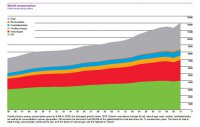I'm wanting to find out more about peak oil and related topics, but I'm not too sure where to start. I've tried looking for documentaries on youtube but most of the ones I've found have been made by conspiraloons who want to link everything to 9/11 being an inside job etc. Are there any decent peak oil documentaries out there? If not what would be a decent book to start with?
It is great that you want to get to know this. Peak oil is one of those areas with huge and vital "I didn't even know I didn't know that" concepts and you can quickly get to a position where you can detect it in the arguments of others with some basic reading round the subject.
The documentaries are accessible, but light on detail. However, they are good for orienting yourself before reading. You might find
The End Of Suburbia interesting - US perspective, but covers the dynamics. Also pay attention to the contributors - (Kunstler, Klare, Campbell, Deffeyes) as their names will come up.
There are several good, general text introductions. I think the best on the link between energy, the economy and the environment is Martenson's "
The Crash Course". It offers, I think, the most accessible foundation on the basics of exponential growth, peak oil and gas, how debt based, fractional lending financial systems work (or, rather, don't), and the implications of their coupling to the energy system. It will help you cut through a lot of the nonsense that gets spouted. You can do it online in
his lectures, but you'll get more out of the book.
Another excellent book is Jackson's "
Prosperity Without Growth", which offers (again, accessibly) a critique of the problems of growth dependence in neoliberal capitalism and neoclassical economics, and discusses the deep problems that are associated with "steady state" (i.e. zero growth) economic programmes.
Finally, if you've the stomach for it, Ahmed's "
A User's Guide to the Crisis of Civilisation" ties energy, food, climate, finance, and militarisation together and offers a really interesting viewpoint from the perspective of Marxist theories of resource scarcity as a political framework. This differentiates itself from conspiracy theory by the quality and depth of the references.
Good luck, and come back here and discuss what you find. It will cement it, and inform others.





